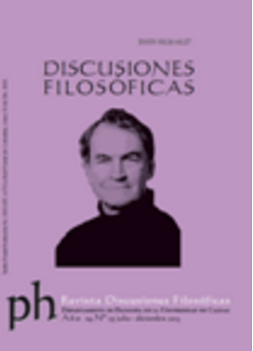Authors
Abstract
How is well known, the problem of akratic or incontinent actions; i.e., those actions characterized because the agent acts against his best judgement, has been of great interest for philosophers since the time of Socrates. In recent theories, like those advanced by Davidson and by Searle, this problem is examined on the basis of openly contrary claims. In this paper, we shall contrast the views of Searle and Davidson on akrasia. We shall suggest that though Searle's solution is philosophically better than Davidson's solution, still has some limitations and that there is room to entertain other alternatives. Finally, we shall offer one alternative way of explaining the problem of akrasia.
References
Caorsi, Carlos. “La teoría davidsoniana de la akrasia”. Signos Filosóficos. Ene-Jun. 2005: 9-30. Impreso.
Davidson, Donald. “How is weakness of the will possible?” Essays on Events and Actions. Oxford: Clarendon Press, 2001. Print.
---. “Paradoxes of Irrationality”. Problems of Rationality. Oxford: Oxford University Press, 2004. Print.
García, Carlos E. y Arango, Pablo R. “La neutralidad valorativa de la ciencia y el conflicto entre la razón y las pasiones”. Discusiones Filosóficas. Jun-Dec. 2010: 223-237. Impreso.
Hoyos, Luis Eduardo. “Irracionalidad”. Ensayos de filosofía práctica y de la acción. Bogotá: Universidad Nacional de Colombia, 2013. Por aparecer.
Searle, John. Rationality in Action. Massachusetts: The MIT Press, 2001. Print.
Wittgenstein, Ludwig. Tractatus Logico Philosophicus. Madrid: Alianza, 1999. Impreso.

 PDF (Español)
PDF (Español)
 FLIP
FLIP
























